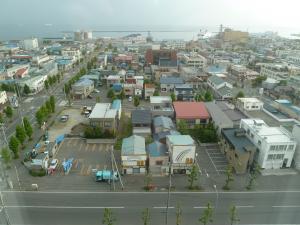Notes from Aomori
A strange coincidence: a magnitude 5 earthquake struck Aomori Prefecture and its vicinity on the night of 15 June, only a few hours after the 8th ITER Council addressed the consequences of the natural disaster that hit Japan on the 11 March 2011.
On 28 April, the Japanese Deputy Minister for Education, Culture, Sports, Science and Technology, Yasutaka Moriguchi, had indeed informed the ITER Organization and the Heads of Delegations to the ITER Council that the disaster had affected some installations involved in the ITER Project: "The JAEA Naka Fusion Institute has suffered [...] damages," he wrote. "In particular, the buildings for superconducting magnet test equipment and neutral beam test equipment were seriously damaged and access to these buildings is restricted to avoid further harm from frequent aftershocks." According to the Deputy Minister, a delay of at least one year is likely to be incurred.
Maintaining the ITER Project schedule was thus one of the important issues discussed at Council this week. It was agreed that every Member will assess its own situation and that a Council-level meeting will be held not later that the beginning of October to put together a collaborative strategic plan for schedule performance recovery. In particular, the possibility of switching or swapping the manufacturing of certain components and systems will be examined.
The meeting went smoothly through the other agenda items. Building and manufacturing progress was evoked, and the Council endorsed a set of guidelines on how to distribute the costs for the additional direct investment items that had materialized following a comprehensive review of the ITER design in 2008.
After the formal meeting, participants visited the International Fusion Energy Research Center that is hosting Broader Approach activities in Rokkasho-mura, including a supercomputer centre which will be provided by Europe, a DEMO R&D building and a prototype accelerator for the IFMIF materials test facility for future fusion reactors. A European and Japanese collaboration in the field of fusion energy, the Broader Approach agreement was concluded for 10 years and represents about EUR 340 million of European investment. It aims to complement the ITER project and to accelerate the realization of fusion energy by carrying out R&D and developing advanced technologies for the future fusion power reactor DEMO.


